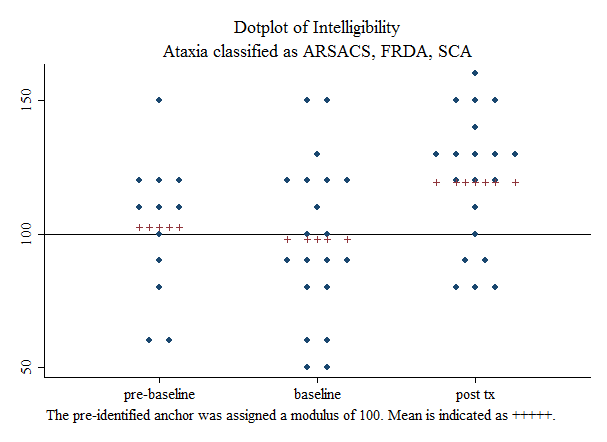Session Information
Date: Sunday, October 7, 2018
Session Title: Ataxia
Session Time: 1:45pm-3:15pm
Location: Hall 3FG
Objective: To test the efficacy and tolerability of intensive home based treatment for dysarthria in ataxia
Background: The loss of the ability to speak is a devastating and inevitable outcome of many neurodegenerative diseases. It results in daily disadvantage, stigmatization, social marginalization and underemployment. Disordered speech is an inevitable consequence of hereditary ataxias.
Methods: We examined the efficacy of a 4-week intensive speech rehabilitation program for 20 people with progressive ataxia due to recessive cerebellar disease (i.e., Autosomal Recessive Spastic Ataxia of Charlevoix-Saguenay [ARSACS], recessive spinocerebellar ataxia [FRDA], or dominantly-inherited cerebellar ataxias [SCA]) using an intra-individual control design. The treatment protocol is based on principles of motor learning and neuroplasticity with a focus on improving speech intelligibility and vocal control. Exercises and feedback were created to enhance self-monitoring and include computer based aural, visual and results feedback and self-management. Efficacy was measured by an expert listener blinded to time-point rating intelligibility of speech samples from the study participants using Direct Magnitude Estimation. (DME). DME dictates that samples are compared to a pre-identified anchor.
Results: In these 20 participants, mean (SD) intelligibility was 98.0 (29.8) points at baseline and 119.5 (25.4) 4-weeks post-baseline with Pearson’s correlation coefficient of 0.9. The relative (%) increase in speech intelligibility from baseline to post-treatment was statistically significant (geometric mean of the post-treatment/baseline ratio 1.25, 95% CI [1.16, 1.35], p<0.0001) using a two-sided paired t-test on base-2 log-transformed outcome data. Relative improvements from baseline in intelligibility of 5-10% represent clinically meaningful change in participants’ speech including significant change in voice quality and naturalness in a variety of tasks (eg. conversation). We saw individual relative increases in intelligibility between -7-80% in our pilot data. On an individual level, 16/17 (94%) patients responded to treatment.
Conclusions: Our preliminary speech rehabilitation data has yielded promising results. Our pilot data shows that even mild dysarthria improves with our intervention. The relative improvement is larger for those ataxia participants (SCA) with more severe dysarthria. A larger trial has been initiated.
To cite this abstract in AMA style:
A. Vogel, N. Rommel, M. Synofzik. Intensive speech rehabilitation in degenerative ataxias improves intelligility [abstract]. Mov Disord. 2018; 33 (suppl 2). https://www.mdsabstracts.org/abstract/intensive-speech-rehabilitation-in-degenerative-ataxias-improves-intelligility/. Accessed July 12, 2025.« Back to 2018 International Congress
MDS Abstracts - https://www.mdsabstracts.org/abstract/intensive-speech-rehabilitation-in-degenerative-ataxias-improves-intelligility/

